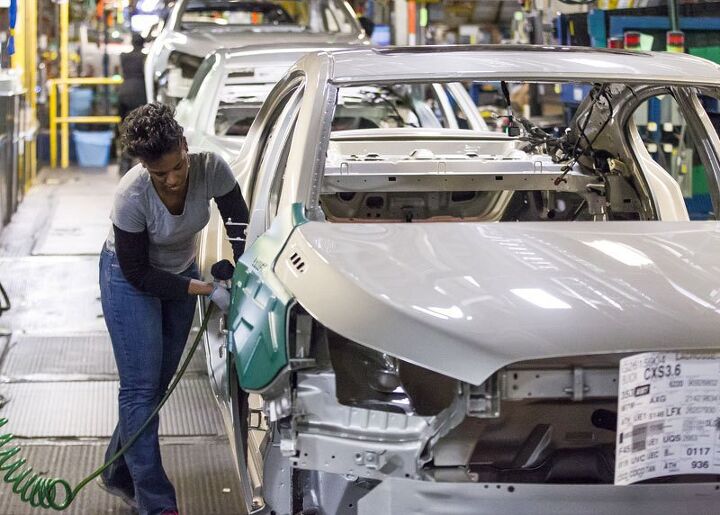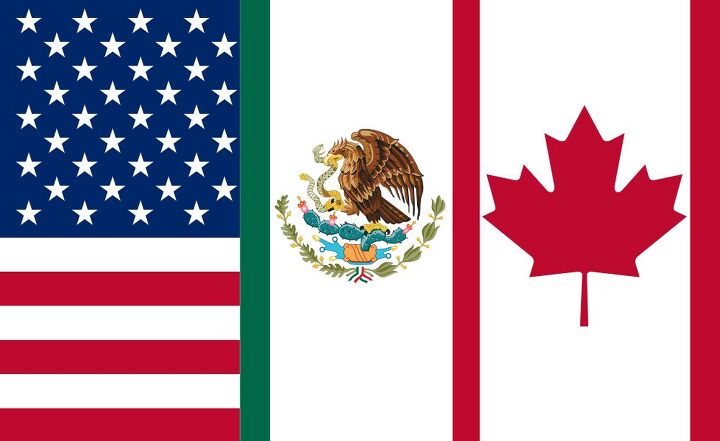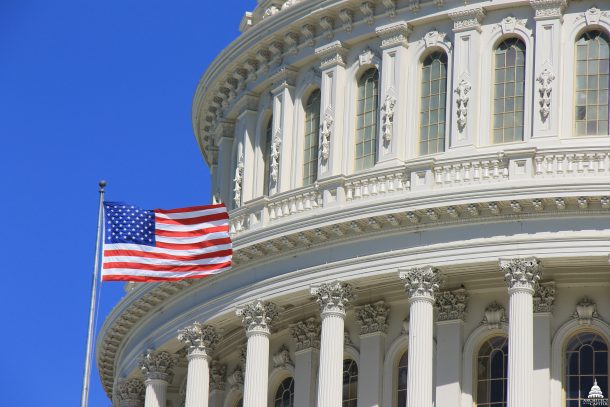#NAFTA
QOTD: Do You NAFTA Go Back?
An “army” of lobbyists has come to Capitol Hill. American automakers are “speaking with a unified voice” in pursuit of a single goal. The business media and papers of record are pushing a message that hasn’t been this identical since this time last year, when they were competing with each other to see who could most strongly support a certain inevitable presidency.
What’s got everybody so upset?
Automakers Unify to Urge Trump to Keep NAFTA
Domestic automakers and suppliers have already expressed concerns that leaving the North American Free Trade Agreement could be detrimental to the industry. Numerous automotive trade groups have claimed that losing NAFTA would result in less efficient and more costly ways of doing business.
Hoping to steer Donald Trump away from the idea of abandoning the three-country accord, manufacturers, parts suppliers, and dealers have come together to form the “Driving American Jobs” coalition. The group’s primary goal is to prove that NAFTA has been beneficial to the participating countries, especially the United States. It also makes the claim that withdrawing from NAFTA would re-establish trade barriers, hurt the U.S. economy and cost jobs.
“We need you to tell your elected officials that you don’t change the game in the middle of a comeback. We’re winning with NAFTA,” urges the group’s website.
Obligatory NAFTA Update: Mexico and Canada Reject U.S. Proposals as Talks Wrap Up
As the fifth round of NAFTA talks come to a close, Mexico and Canada continue to reject the United States’ demands regarding automobiles, diary, dispute panels, government procurement and the sunset clause. Among the more recent automotive proposals kicking up dirt is the U.S.’s wish to include steel in NAFTA’s tracing list and increase the mandatory local content of every car built in North America. The attempt has annoyed foreign officials and left the industry fretting about increased production costs and complexity.
The increasingly tense nature of the talks has left many wondering if President Trump will make good on his earlier threat to leave NAFTA. However, plenty of analysts are of the mind that a deal will eventually be reached between the three countries.
Ending NAFTA Could Cost U.S. 50,000 Auto Jobs: Study
Automotive trade groups have issued warnings about the scrapping of the North American Free Trade Agreement all year. In January, the Center for Automotive Research claimed killing NAFTA could result in the elimination of at least 31,000 auto jobs within the United States. This week, a new study sponsored by the Motor Equipment Manufacturers Association upped that estimation to around 50,000.
With early negotiations not going particularly well at the moment, the new tally serves as a potential warning. If NAFTA is abandoned, North American countries would all likely revert to rules dictated by the World Trade Organization, resulting in higher tariffs from all sides.
While 50,000 fewer jobs is the upper echelon of what could be expected, a few things have to go wrong for it to reach that point. First, Mexico and Canada would have to revert to pre-NAFTA tariff levels — which were comparably higher than the United States. If so, manufacturers would almost assuredly begin sourcing more parts from the same countries where the vehicles are assembled, and gradually move production to lower-cost regions like China.
U.S. Is Intentionally Sabotaging NAFTA Trade Talks, Officials Claim
President Donald Trump entered into office threatening to abandon the North American Free Trade Agreement if the United States was not given a better deal immediately. But, after negotiations began, it looked as if his ultimatum would be unnecessary.
Now, U.S. officials involved in NAFTA negotiations are being accused of making proposals on issues Mexico and Canada have said they would never agree to. Are these bold negotiation tactics being used to place the U.S. in a better position for future issues, or are trade arbitrators intentionally trying to sabotage talks so Trump can make good on his promise to leave the agreement?
American Automotive Groups Are Formally Siding Against U.S. NAFTA Proposals
When Donald Trump took office, one of his first presidential acts was to rally domestic automakers for a series of meetings and promise to remove regulatory barriers. As the administration was a self-described ally to the car industry, the claim appeared genuine. There was some tough talk about foreign involvement but, for the most part, Trump appeared to be in domestic manufacturers’ corner.
As focus shifted toward the renegotiation of the North American Free Trade Agreement, automakers had one request: to not impede cross-border trade. It was their primary concern leading up to this week’s talks.
Two days later and the issue has become a major sticking point; placing auto industry groups from Canada, Mexico, and the United States at odds with the current administration. As NAFTA talks began in Washington, D.C., automaker and parts groups from all three countries began outright pleading with U.S. negotiators to abandon their push for tighter rules of origin. Now they are formally opposing it.
NAFTA Renegotiations Begin, Automakers Worried Over Rules of Origin
The first round of the North American Free Trade Agreement renegotiations begins on Wednesday. U.S. President Donald Trump, Mexican President Enrique Peña Nieto, and Canadian Prime Minister Justin Trudeau have planned to meet in Washington, D.C. on August 16th and stay through the 20th to discuss trade policy. Afterward, NAFTA debates will be led by U.S. Trade Representative Robert Lighthizer, Canadian Foreign Minister Chrystia Freeland, and Mexican Economy Minister Ildefonso Guajardo.
While this all began as a Trump campaign promise to renegotiate a better deal for the United States (or abandon the trade agreement entirely), it has evolved over the last six months into an opportunity to modernize NAFTA policies. There’s no firm deadline for the three countries to reach an agreement, but Mexico is pushing for the process to wrap up before its presidential campaign begins in earnest in February.
NAFTA Trading Partners Agree: It's Time for a Change
Mexico and Canada are finally in agreement that NAFTA could use an update, not that the Trump administration gave them much of an opportunity to refuse renegotiations. However, after taking a critical look at the two-decade old agreement, representatives from all three nations have reached the consensus that it’s time for a change.
At Wednesday’s CAR Management Briefing Seminars, Colin Bird, minister-counselor for trade and economic policy at the Canadian Embassy, and Francisco Sandoval-Saqui, a Mexican trade official for his country’s Ministry of the Economy, laid out their country’s agendas for the NAFTA trade talks slated to begin in Washington, DC on August 16th.
Both countries are eager to make cross-border trade more fluid without handing an unfair advantage over to the United States. President Trump has previously accused NAFTA of being “the worst trade deal maybe ever signed anywhere, but certainly ever signed in this country,” and immediately moved to dismantle it upon taking office. While his stance has softened over the last few months and the reins have been handed over to Robert Lighthizer, Trump has remained bullish on the issue — claiming domestic automakers are giving away U.S. jobs and income to Canada and Mexico.
U.S. Seeking a Trade Deficit Reduction in Early NAFTA Talks and Not Much Else
Despite President Trump having initially framed his proposed NAFTA renegotiations as a hardline “America First” endeavor, the administration’s stance has soften significantly. In a recent summary of objectives, U.S. Trade Representative Robert Lighthizer highlighted fairness as the key issue throughout.
Absent were any mention of abandoning the deal if certain conditions were not met and the steep tariffs previously alluded to by the president. In fact, any mention of tariffs specifically targeted their reduction or elimination — for both imported and exported goods. There are, however, numerous examples that reaffirm the Trump administration’s earlier objectives and a handful of inclusions that should please domestic automakers.
Two-thirds of Post-recession Manufacturing Jobs Were a Result of Foreign Investment, Says Study
As the Trump administration applies pressure to encourage companies to manufacture goods within U.S. borders and bolster American employment (or potentially face towering tariffs), the president has more recently come out against foreign automakers directly. In late May, Trump responded to criticism from German Chancellor Angela Merkel by accusing her country of having a trade surplus with the United States — claiming its automakers send vehicles to North America while providing little else. Trump has levelled similar criticism at China.
However, there’s a problem with his assertion. Foreign companies may not always contribute the majority of their wealth towards improving the U.S. economy, but they do invest heavily into the country. In fact, a recent analysis of federal jobs data shows two-thirds of the 656,000 manufacturing jobs created between 2010 and 2014 can be attributed directly to foreign investment.
Accurate employment figures for the following years aren’t yet available. But, with an additional $700 billion in capital coming in from non-domestic sources, total foreign investment reached $3.7 trillion by the end of 2016 — a new record.
No Deadline for NAFTA Talks Despite Industry Plea for a Quick Turnaround
U.S. Trade Representative Robert Lighthizer said on Wednesday there was no definitive timeline for completing NAFTA trade renegotiations. Discussions haven’t even begun between the United States, Canada, and Mexico but legislators and executives have already warned prolonged negotiations would likely be detrimental to their interests.
The automotive industry is mainly seeking a swift and unambiguous update that doesn’t rock the boat too severely. Every day there is no consensus on the trade agreement is another day it has to postpone large investments. Ideally, the U.S. wants the redrawn NAFTA to prioritize its workforce and industry, while the Trump administration aims to tax imports and force companies to do more business within its borders. But, with nothing finalized, many automakers are in a holding pattern. Volkswagen, for example, is putting off decisions on major U.S. investments until it becomes clearer what course NAFTA will take.
Expanded Production in U.S. Hinges on Trump Trade Decision, Volkswagen Hints
Volkswagen’s sole U.S. assembly plant was spared any fallout from the company’s wildly expensive diesel emissions scandal, but the upcoming North American Free Trade Agreement negotiations could see VW throttle back its future plans for the facility.
The Chattanooga plant, which builds the Passat and Atlas, has seen $900 million in investment over the last couple of years. More models are anticipated, and the automaker said it expects the plant to reach full production by 2020. However, recent threats of an import tax to be levied on German automakers has VW brass in wait-and-see mode before sending any new models or money to Tennessee.
U.S.-Built Mercedes-Benz Models to Become More American
Call it the Americanization of Mercedes-Benz. While the German automaker has assembled C-Class, GLE and GLS models in Alabama for some time (and, more recently, Sprinters in South Carolina), recent pressure from the Trump administration has led the automaker to reconsider what goes into those vehicles.
After being characterized by President Trump as “very bad,” it’s possible other German automakers operating in the U.S. could follow Mercedes’ lead in a bid to avoid further heat.
Don't Touch Vehicle Content Rules, Say Automakers Ahead of NAFTA Negotiations
As the clock counts down to the beginning of talks aimed at revamping the North American Free Trade Agreement, automakers in Mexico, the U.S. and Canada know one thing they don’t want to see changed — rules of origin.
Auto manufacturers must abide by minimum regional (NAFTA-wide) content rules in order for vehicles to remain free from import tariffs. President Trump’s proposed reforms aim to benefit U.S. companies, but could lead to greater costs heaped onto automakers — something no profit-minded company desires.
Naturally, automakers wants their feelings known well before the three countries get down to brass tacks.
U.S. Plans to Schedule Opening NAFTA Talks in Roughly 90 Days
U.S. Commerce Secretary Wilbur Ross want to begin formal talks to renegotiate the North American Free Trade Agreement with Canada and Mexico in a little over three months, adhering to the campaign pledges made by President Donald Trump last year. Ross explained to reporters that “sometime in the next couple of weeks” he will issue a notice to Congress stating the Trump administration intends to start formal NAFTA negotiations in just 90 days.
However, since he expressed his intentions in front of a gaggle of reporters, Congress is probably already aware. But it won’t be “official” until they get a piece of paper signed by the appropriate parties on the applicable letterhead — hopefully, embossed with a fierce-looking eagle surrounded by dollar signs.



























Recent Comments